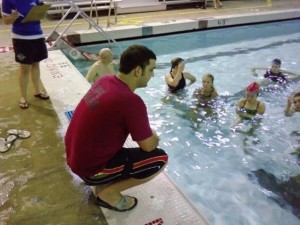
Summer seasons are normally characterized by warm weather, sun basking and swimming hence the need to know safety in water. Water bodies provide the perfect opportunity for cooling the body but many people are unaware of how to stay safe in water environments. In a bid to combat the heat, many people risk their own lives by doing things like diving in shallow water or entering water without strong swimming skills. Children and young adults are generally at a higher risk of drowning. Although lifeguards are present to protect swimmers, safety should not be overlooked. To learn some basics on water safety or how to help individuals that have been rescued from water environments we strongly recommend you attend a first aid course (click here to find a course near you). In the meantime these essential tips will come in handy:
Swim Smart
One of the most effective techniques of being safe while in the water is swimming in groups. Having partners could mean the difference between life and death in some cases. This applies for pools, beaches or lakes. Bear in mind that even the seasoned swimmers may still require help at times.
Another smart way of ensuring safety in water is by preparing for disasters in ample time. Life skills like rescues and CPR are quite essential. Both parents and children are advised to sign up for these classes. Also, it’s advisable to swim within your limits. Many people overestimate their abilities, especially when being challenged.
[youtube url=”http://www.youtube.com/watch?v=rFv9NXXyYNk” width=”200″ height=”200″]Swim Safe
It is always best to swim in the safest areas of the water bodies. Be sure that you’re in a position easily accessible by others in case a rescue attempt is required. Beginners ought to stay in shallow waters and under the supervision of trainers or lifeguards.
Oceans, lakes and rivers have stronger currents. This means that you’ll need more energy to swim across. To enhance safety in water bodies that are open, do not swim against the current. Swimming parallel to it will enable you to use lesser energy.
Exercise Caution When Diving:
Many injuries are sustained at pools when people are diving. It has been reported that the victim can suffer from a permanent damage to the spinal cord in many cases. Paralysis and death are common in severe cases. It is important to protect your life and this can be achieved by exercising caution. Make sure that you dive only in the areas that are supervised.
Safety in water demands paying attention to signs. Those with the habit of ignoring warnings that are designed to enhance safety are risking their own lives. Never attempt to swim or dive in an area where these activities are prohibited. There is reasonable explanation as to why the signs were erected in the first place. Open bodies are riskier because they tend to hide rocks under the water.
Drink Lots of Fluids:
Stay hydrated by drinking lots of fluids. Summer is usually hot and comes with the effects of dehydration. These include: Nausea, lightheadedness and dizziness. Active people tend to suffer a lot from this condition. Make sure that you drink plenty of water. Safety should be top priority for all those concerned with their lives.
Fresh fruit juices can suffice but steer clear from alcohol. This intoxicating drink will alter judgment which will lead to accidents as a result. Go ahead and have fun but keep in mind these essential tips for safety in water.